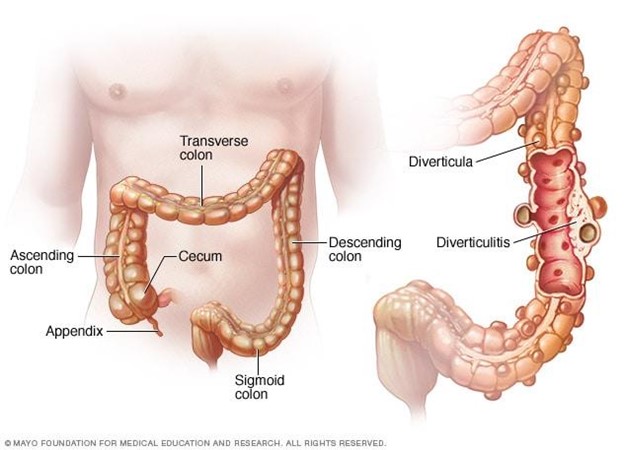A nurse is creating an education plan for a client who has diverticulosis. The nurse should plan to include which of the following in the client education?
Increase protein from red meat
Decrease fluid intake
Incorporate soft foods that are pureed in consistency
Increase dietary fiber
The Correct Answer is D
Choice A Reason: Increasing protein from red meat is not part of client education, as it can worsen the condition and increase the risk of complications. Red meat is high in fat and low in fiber, which can cause constipation and increase the pressure in the colon. Diverticulosis is a condition where small pouches or sacs form in the wall of the colon due to weak spots or increased pressure.
Choice B Reason: Decreasing fluid intake is not part of client education, as it can worsen the condition and increase the risk of complications. Fluid intake should be increased to prevent dehydration and promote bowel movements. Diverticulosis can cause abdominal pain, bloating, cramping, and changes in bowel habits.
Choice C Reason: Incorporating soft foods that are pureed in consistency is not part of client education, as it can worsen the condition and increase the risk of complications. Soft foods are low in fiber and can cause constipation and increase the pressure in the colon. Diverticulosis can lead to diverticulitis, which is inflammation or infection of the pouches or sacs.
Choice D Reason: This is the correct choice. Increasing dietary fiber is part of client education, as it can improve the condition and prevent complications. Fiber helps soften the stool and reduce the pressure in the colon. Diverticulosis can be managed by eating a high-fiber diet, drinking plenty of fluids, exercising regularly, and avoiding straining or holding stools.

Nursing Test Bank
Naxlex Comprehensive Predictor Exams
Related Questions
Correct Answer is C
Explanation
Choice A Reason: Inserting a nasal swab to observe the fluid is contraindicated, as it can introduce infection or increase intracranial pressure. The fluid can be tested for glucose or halo sign to confirm cerebrospinal fluid (CSF) leakage.
Choice B Reason: Suctioning the nose gently with a bulb syringe is also contraindicated, as it can create negative pressure and increase CSF leakage or cause meningitis.
Choice C Reason: This is the correct answer because allowing the drainage to drip onto a sterile gauze pad can prevent contamination and facilitate observation of the amount and characteristics of the fluid.
Choice D Reason: Inserting sterile packing into the nares is not recommended, as it can obstruct the drainage and increase intracranial pressure or infection risk.
Correct Answer is A
Explanation
Choice A Reason: This is correct because first degree burns are superficial burns that affect only the outer layer of the skin, called the epidermis. First degree burns cause redness, pain, and mild swelling, but no blisters or scarring. They usually heal within a week.
Choice B Reason: This is incorrect because second degree burns are partial thickness burns that affect both the epidermis and the underlying layer of the skin, called the dermis. Second degree burns cause blisters, severe pain, and possible infection. They may take several weeks to heal and may leave scars.
Choice C Reason: This is incorrect because third degree burns are full thickness burns that destroy all layers of the skin and may damage the underlying tissues, such as muscles, nerves, or bones. Third degree burns cause charred or white skin, numbness, and shock. They require skin grafting and may cause permanent disability or death.
Choice D Reason: This is incorrect because this burn can be classified according to the depth and extent of the skin damage. The classification of burns helps to determine the appropriate treatment and prognosis for the client.
Whether you are a student looking to ace your exams or a practicing nurse seeking to enhance your expertise , our nursing education contents will empower you with the confidence and competence to make a difference in the lives of patients and become a respected leader in the healthcare field.
Visit Naxlex, invest in your future and unlock endless possibilities with our unparalleled nursing education contents today
Report Wrong Answer on the Current Question
Do you disagree with the answer? If yes, what is your expected answer? Explain.
Kindly be descriptive with the issue you are facing.
